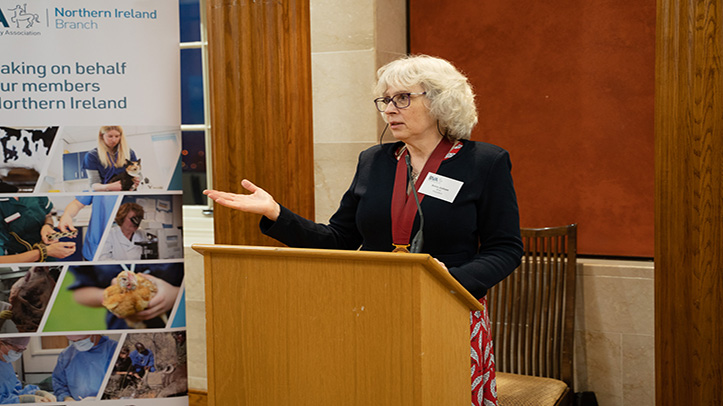In her first major speech as British Veterinary Association (BVA) president, Dr Anna Judson raised concerns about the serious risk posed to public health and animal welfare if a permanent and sustainable solution is not found to ensure continued access to veterinary medicines in Northern Ireland beyond 2025.
Speaking at BVA’s 2023 annual Northern Ireland dinner in Stormont, Dr Judson reminded attendees of the disastrous consequences should Northern Ireland lose access to 51% of vet medicines due to the Northern Ireland Protocol.
Potential losses include salmonella and leptospirosis vaccines, both of which prevent diseases affecting animals and people, as well as flu and tetanus vaccines for horses and insulin for dogs and cats.
Dr Judson praised the hard work by BVA’s Northern Ireland branch team, particularly that of past president Mark Little, in securing a three-year grace period, meaning access to vet medicines continues under existing regulations until 2025.
Although Dr Judson welcomed the extension, BVA continues to lobby the UK Government and European Commission to prioritise the issue.
Dr Judson said: “It is absolutely vital that high standards of animal welfare and public health is protected. Finding a permanent solution must be a top priority ahead of the grace period expiration in 2025 to protect animal welfare and protect public health.”
She highlighted the importance of ensuring animal health and welfare is central to the Department for Agriculture, Environment and Rural Affairs’ new Future Farming Framework, which will directly and indirectly support the department’s primary policy priorities.
BVA is urging collaboration between government, vets and industry to design a scheme that will ensure vet-farmer engagement, long-term improvement and maximise opportunities around animal health and welfare.
Dr Judson said: “Investment in animal health and biosecurity is also an investment in human and environmental health, and it contributes to the efficiency and sustainability of our food production systems and agricultural sector as a whole. It is vital that sufficient funding is allocated.”
Dr Judson pressed the great need for more accessible veterinary education in Northern Ireland. Being the only part of the UK without a dedicated vet school, this means that not only do potential Northern Ireland students move away to study, but many do not return after qualifying, having put down roots in other parts of the UK.
Dr Judson said: “Tackling issues like this is very close to my heart: One way to do this is through the provision of inclusive veterinary education which helps to break down the economic, social and geographic barriers which may prevent students from entering the profession.
“There is also the need to address the ongoing workforce shortage and the provision of local veterinary education could play a key role in this.”


